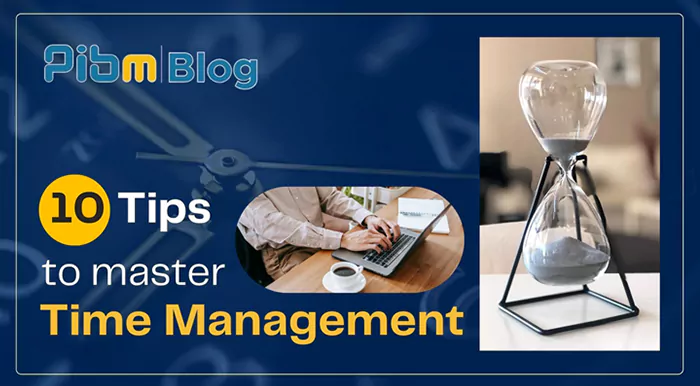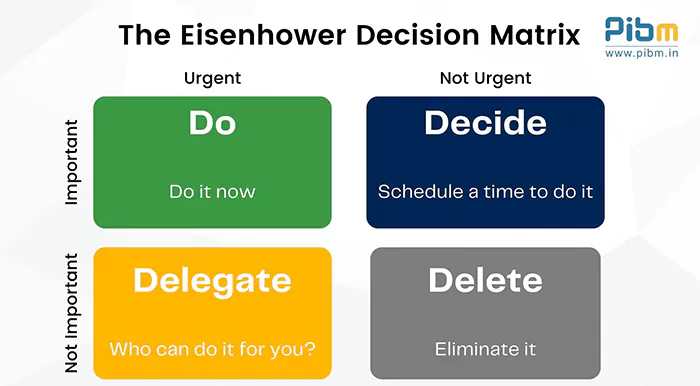PIBM Blog
Education Does Not Only
Happen in the Classroom
PIBM Blog
10 Tips: Master Time Management Like a Pro

Read the entire blog to know how to master time management like a pro.
The Bad news is Time flies. The Good news is You’re the Pilot.
These are the words of the eminent motivational speaker Michael Altshuler.
Since childhood, we've been taught to be the pilot of our dreams, but to be that, we've to be the pilot of our own lives. As children, we learned the importance of time and how to use it through various experiences. Whether rushing to finish homework or making the most of free periods, we understood its value. At school, each subject had a set time, and once classes ended, we embraced the playground, oblivious to the passing hours.
Sadly for children as well as adults, nowadays, our routine life has surpassed the boundaries of school or office life and has intervened in our personal time. The only solution to having separate personal time is mastering time management skills.
So, if you are someone who feels that free time is a luxury and is failing to achieve a healthy balance between work and free time, this blog is for you. Let’s delve deeper into the top ten time management hacks that can become your lifesaver. Don’t miss the bonus tip at the end of this blog.
- Creating a To-Do List
The very first step in effective time management is creating a to-do list. It provides a clear visual of your tasks, allowing you to prioritize by ticking or highlighting the important ones. This helps you focus your efforts and time on achieving your immediate goals.
You can also add a column for estimating the time required for each task based on your experience. This not only gives you a clear plan for the day but also brings peace of mind. Now, all that's left is execution, which leads us to the next tip. - Beating Procrastination
Procrastination, the enemy of productivity, can be overcome through introspection. Take some time to understand the reasons behind your procrastination, as it can solve half of the problems. Procrastination may arise due to fear of failure, lack of motivation, or feeling overwhelmed.
Once you identify the root cause, you can develop strategies to overcome it. Breaking tasks into smaller, manageable parts, setting deadlines, and creating a schedule with specific time slots for each task are recommended. Embracing the "5-minute rule," where you commit to working on a task for just five minutes, is a good option for managing procrastination. Once you start, you'll find the momentum to continue. - The Pomodoro Technique
The Pomodoro Technique, invented by Francesco Cirillo, is an effective time management tool. It involves dividing your work into intervals called "Pomodoros" typically lasting 25 minutes. You can take a short break of about 5 minutes between each Pomodoro. After completing four pomodoros, you can take a longer break of around 15 to 30 minutes.
Using this method helps maintain focus and motivation. It's advisable to track your intervals and strictly adhere to the time limits using a timer or specific Pomodoro apps. Working in focused bursts using the Pomodoro Technique can boost productivity. - Eliminating Distractions
Dealing with distractions can be challenging in our technology-oriented world, where we rely heavily on our smart gadgets. Distractions like frequently checking social media notifications or experiencing the Fear of Missing Out (FOMO) can increase anxiety and disrupt our daily work.
The best way to tackle distractions is by sticking to your to-do list. Set small goals, consciously limit screen time, engage in daily meditation, and consider other effective measures. Personalized approaches like using visual reminders, creating a comfortable work environment, rewarding yourself, or incorporating workouts can also help you stay focused and eliminate distractions effectively. - Learn to Say No
One of the main obstacles to efficient time management is taking on too many responsibilities. To prioritize your work and protect your time, it's important to learn how to say no. Politely decline requests that conflict with your priorities or would overload your schedule. By saying no when necessary, you create more time for the tasks that truly matter. - Delegate when Possible
While it's admirable to display leadership qualities and handle everything on your own, sometimes tasks come with deadlines that make delegation necessary. When delegating tasks, consider who is best suited for each task and assign them accordingly. Failing to delegate appropriately can result in unnecessary rework. - Avoid Multitasking
In today's world of split screens, multitasking may seem appealing. It's often considered a great feature of smartphones, especially among Gen Z. However, research shows that multitasking in a professional setting causes more harm than good. While it may seem to save time, it comes at the expense of work quality. In a professional environment, it's crucial to focus 100% on the task at hand and avoid working on multiple projects simultaneously. - Set Realistic Goals
You know yourself better than anyone else, so it's important to set achievable goals. While it's tempting to create grand and ambitious plans, it's better to imagine yourself as an underachiever. This allows for buffer time if anything goes wrong. It prevents burnout and ensures you can accomplish your goals without overwhelming yourself. - Take Strategic Breaks
Contrary to common beliefs, taking breaks is a vital aspect of efficient time management rather than a waste of time. Well-timed breaks can enhance concentration and productivity. Schedule regular pauses to refuel and revitalize instead of pushing yourself to work nonstop. During these breaks, you can engage in activities like stretching, quick walks, or mindfulness exercises. Research shows that regular breaks can improve overall cognitive function, stimulate creative thinking, reduce anxiety, and promote better time management. - Reflect on Progress and Adjust
Flexibility is crucial in time management because even the strictest schedules may not always go as planned. You might need to add or subtract a few hours depending on your progress with the current task. Both physically and mentally, be adaptable to address urgent and important tasks effectively.

Bonus Tip: Eisenhower Matrix
The Eisenhower Matrix, also known as the Urgent-Important Matrix, is a useful tool for prioritization. It helps categorize tasks based on their urgency and importance, dividing your responsibilities into four quadrants:

- Urgent and Important: These tasks require immediate attention and should be prioritized as they are crucial.
- Important but Not Urgent: Tasks in this quadrant are significant but can be put off since they are not urgent.
- Urgent but Not Important: These tasks are better suited for delegation or automation as they require immediate attention but are not relevant to your skill set.
- Not Urgent and Not Important: Tasks in this quadrant are neither essential nor urgent, and it's best to remove them from your list.
By applying the Eisenhower Matrix, you can effectively master time management like a pro!
Time management is an important skill, mastering which can make you efficient with your everyday professional and personal life. Remember to follow the above tips if you are unable to make the most of your 24 hours. Let us know which one of these tips helped you the most to utilize your time wisely. So, Carpe-Diem! And stay tuned for more enlightening content.








